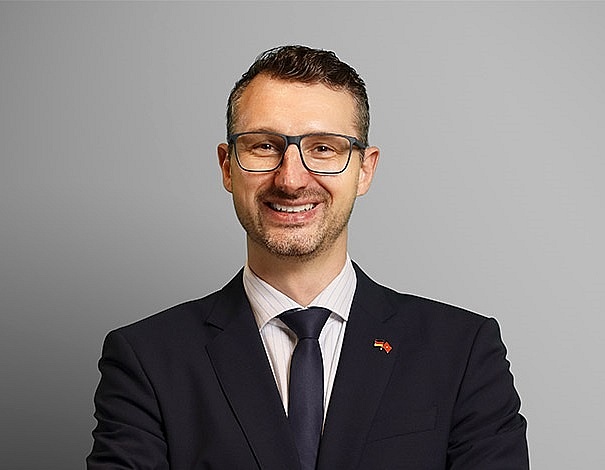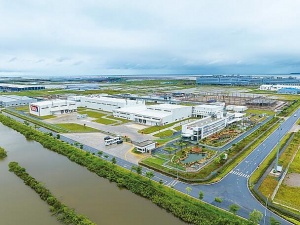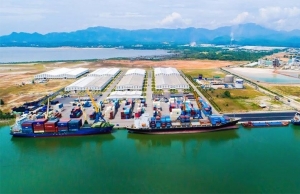Vietnam’s thriving market: a magnet for German investors
Additionally, the expanding local market presents lucrative opportunities for companies seeking to establish a presence in Vietnam. These factors combined make Vietnam a strategic choice for German companies looking to expand their operations and tap into the country’s promising economic landscape.
 |
| Peter Kompalla, chief representative Delegation of German Industry and Commerce in Vietnam, Cambodia, Myanmar, and Laos |
German investment began to flourish when Vietnam joined the World Trade Organization in 2007 and following the 2015 amendment of the laws on Enterprise and Investment. Today, 530 companies from Germany have invested roughly $3.6 billion in Vietnam (this being an adjusted overall value, not foreign direct investment), and they have created about 50,000 jobs.
According to the results of the AHK WBO Spring 2024 survey, 55 per cent of German companies expect growth in their businesses, 55 per cent are optimistic about their business operations in Vietnam over the next 12 months, and 57 per cent anticipate economic growth in Vietnam. There are certainly many reasons why Vietnam has become such an attractive destination now.
The first reason is Vietnam’s strategic position in ASEAN, helping it become a pivotal hub for international trade, especially with the China+1 strategy driving investment in manufacturing, electronics, and now, semiconductors. With dynamic growth, a young, skilled population, stable politics, low inflation, and advanced infrastructure, Vietnam stands as a promising hub for German companies seeking to diversify their supply chains and production in Asia.
Secondly, Vietnam’s commitment to market liberalisation, on par with Singapore, enhances its attractiveness for foreign investment. Investors have the option to establish their 100 per cent foreign-owned subsidiaries in Vietnam, benefiting from tax incentives and other government support measures.
Moreover, Vietnam’s government offers enticing incentives for foreign-owned enterprises, coupled with a commitment to environmental sustainability and net-zero goals by 2050. This aligns with German businesses’ investment trends in high technology, renewable energy, and eco-friendly practices.
Germany has strategically directed investments in Vietnam towards the service sector. The general services industries, business process offshoring/outsourcing, and logistics dominate around one-third of projects. According to Destatis, trade between the two sides has shown a consistent rise over the years, from slightly over $1 billion in 2000 to a substantial $18.6 billion by 2023.
This upward trajectory has attracted numerous companies specialising in machinery, chemicals, and food sectors to invest in Vietnam, drawn by the promising market potential and increasing opportunities for business development.
Most German companies focus on sales and after-market activities. For example, Zott is marketing its products (such as Monte pudding) with over 750 staff in Vietnam. Business process offshoring/outsourcing has lately become an increasingly attractive function for German investments. About 70 companies have been established in this field so far. The biggest single employer in this industry is DIGI-TEXX, with over 1,500 employees, mostly located in Ho Chi Minh City.
Ho Chi Minh City remains the top investment destination in Vietnam. More than half of German companies in Vietnam were established here, with 75 per cent in the service sector. Hanoi ranks second, while Binh Duong and Dong Nai in the south are the most attractive locations for manufacturing operations.
Currently, there are 109 manufacturing sites of German companies located in Vietnam. The largest German manufacturing investments have been implemented by Bosch, STADA-Pymepharco, and Messer. Bosch is employing a major manufacturing complex for push belts in Dong Nai, while also operating a research and development centre in Ho Chi Minh City. STADA-Pymepharco manufactures pharmaceuticals in its factory in the south-central province of Phu Yen, and Messer supplies gases to local customers such as Hoa Phat from its main production hubs in Hai Duong and Quang Ngai provinces.
The presence of German companies has contributed to the socioeconomic development of Vietnam. They are committed to upskilling their employees through various programmes and collaborations with local universities. These companies adhere to global standards, particularly in technology, sustainability, and compliance.
They also prioritise working with local suppliers to transfer knowledge and expertise to the Vietnamese economy. Furthermore, German investors in Vietnam have a long-term perspective and demonstrate a strong interest in the welfare of local communities.
 | German investors continue to bet on the Vietnamese market Vietnam has emerged as a potential investment destination for German companies, who are increasing their presence in the country. |
 | German investors eager for Binh Duong Binh Duong People’s Committee held a meeting on March 19 with the German Business Association (GBA) in Vietnam, along with 40 German firms wishing to explore investment opportunities in the region. |
 | German players leading wave of Euro investments European companies including German ones continue to venture into Vietnam as part of their efforts to diversify supply chain and strengthen manufacturing base in Asia. |
What the stars mean:
★ Poor ★ ★ Promising ★★★ Good ★★★★ Very good ★★★★★ Exceptional
Related Contents
Latest News
More News
- Kurz Vietnam expands Gia Lai factory (February 27, 2026 | 16:37)
- SK Innovation-led consortium wins $2.3 billion LNG project in Nghe An (February 25, 2026 | 07:56)
- THACO opens $70 million manufacturing complex in Danang (February 25, 2026 | 07:54)
- Phu Quoc International Airport expansion approved to meet rising demand (February 24, 2026 | 10:00)
- Bac Giang International Logistics Centre faces land clearance barrier (February 24, 2026 | 08:00)
- Bright prospects abound in European investment (February 19, 2026 | 20:27)
- Internal strengths attest to commitment to progress (February 19, 2026 | 20:13)
- Vietnam, New Zealand seek level-up in ties (February 19, 2026 | 18:06)
- Untapped potential in relations with Indonesia (February 19, 2026 | 17:56)
- German strengths match Vietnamese aspirations (February 19, 2026 | 17:40)

 Tag:
Tag:




















 Mobile Version
Mobile Version